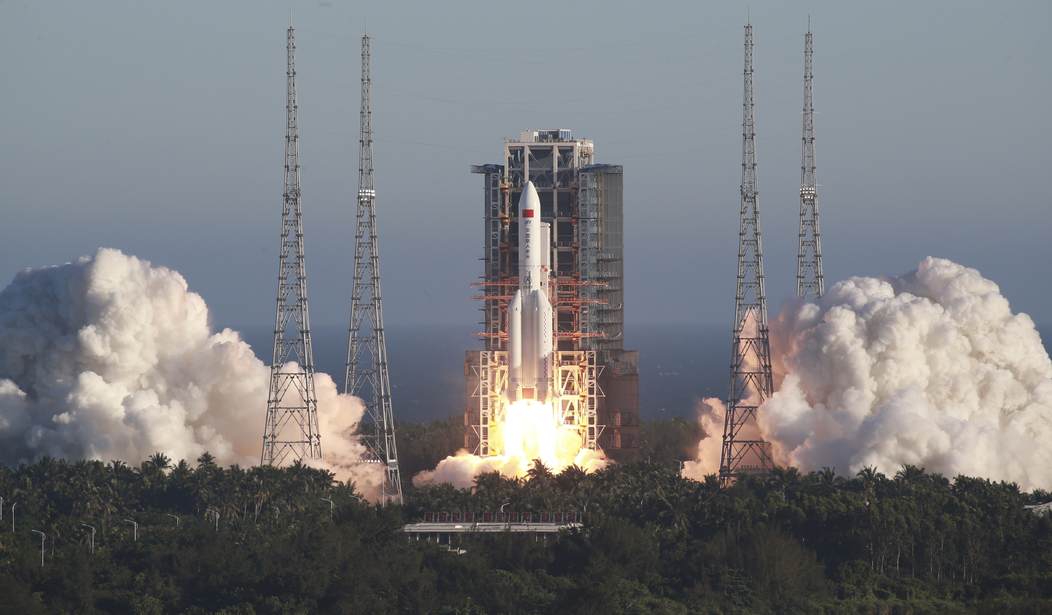When the Soviets put the first artificial satellite, Sputnik, into orbit, it rattled America right to our foundations — and our response to the Soviet challenge was as devastating over the long run as it was swift.
We face a similar challenge from Communist China today, and our response has been less than “Meh.”
Before we get to today, a little perspective.
I wasn’t around in the late ‘50s or early ‘60s, but my Right Angle boss and cohost (and fellow space enthusiast) Bill Whittle was.
“Everything became about space,” is how he’s described that time to me on more than one occasion.
As it ought to have been.
Imagine our preeminent position in the postwar world. American bombers had devastated the German economy during the war, saving countless Allied and Soviet lives by shortening the war. American bombers had done even worse to Japan, and in shorter order. By the time Boeing B-29 heavy bombers had dropped not one, but two nuclear bombs on Japan, it was merely the coup de grace that forced Emperor Hirohito and his military clique to admit the obvious.
The “obvious” was that American dominance of the air, both made possible and enhanced by our engineering prowess, was irresistible.
Yet just 12 years later, the Soviets threatened to end our air dominance by dominating the next realm up: space.
The tiny satellite that did nothing other than orbit the Earth for 22 days while emitting a radio signal back to Earth generated what we now call “The Sputnik Crisis.”
President Dwight Eisenhower reacted almost at once, and in his wake, so did every politician worth his salt. The Advanced Research Projects Agency (later known as DARPA with a D for Defense) owes its existence to the Sputnik Crisis, and countless other defense measures were launched.
Not to mention the creation of NASA and our fledgling space program being given top priority.
Perhaps the biggest priority was given to education, where Washington unleashed the money floodgates for what we now call STEM education.
There aren’t many things that government does well, but marshalling massive resources during a crisis is one of them.
The Soviets simply couldn’t match our resources, financial, technological, or educational. The result was that by the mid-’60s, our space program had largely caught up with theirs, and that before the end of the decade, we had sent men to the Moon and returned them safely to Earth.
In fact, American dominance of space was so close to complete that it, more than anything else, won the Cold War for the West.
If you’ll recall, Soviet premier Mikhail Gorbachev believed his country was unable to compete with Ronald Reagan’s space-based Strategic Defense Initiative — our first serious forays into missile defense. Gorbachev was so desperate, in fact, that at their 1986 Reykavik summit, Gorbachev actually proposed abolishing nuclear weapons in exchange for the U.S. giving up SDI.
Reagan refused, against all advice, and the Cold War was basically won at a meeting in Iceland.
Right now, Communist China threatens to end our dominance on the seas, in the air, and in space.
China is engaged in the largest naval buildup in history, and while their crews are untested, the People’s Liberation Army Navy (actual name!) is working hard at training them up. Already, the PLAN has more — if generally smaller — ships than we do. As a regional power (at least for the moment), China’s navy also has an easier mission than the U.S. Navy does, with its global responsibilities to protect our commerce.
Meanwhile, our Navy’s procurement of surface vessels has become an unfunny — not to mention dangerous — joke. The first of our new class of super-modern nuclear-powered supercarriers, the USS Ford, is years behind schedule and billions over budget. That, we could deal with. But the fact that the Navy won’t perform a proper shock test on the Ford means we have no idea how she’ll perform in battle.
Assuming we ever get her battleworthy.
Chinese aerospace engineers are now some of the best in the world, producing stealthy jets and perhaps even taking the lead in the hypersonic missiles that will define the next generation of air power — and put our missile defenses to the ultimate test.
Most chilling though is the increasing contrast between our education systems.
Our saving grace is our burgeoning private space industry, which is driving costs down and attracting engineering talent from all over the world — but will it be enough?
Chinese universities — whose best professors were trained at American universities — graduate more engineers each year than the U.S. By 2017, Chinese engineering graduates outnumbered their American counterparts by eight to one. That ratio is expected to worse to 15-to-one by 2030.
How are we responding to this challenge?
By infesting our STEM classes with malicious critical race theory and using federal loan guarantees to subsidize literally any kind of degree, no matter how ultimately worthless.
At a time when we desperately need to double down on the engineering talent that made this country the most innovative, wealthy, and secure, we are literally doubling down on stupid.










